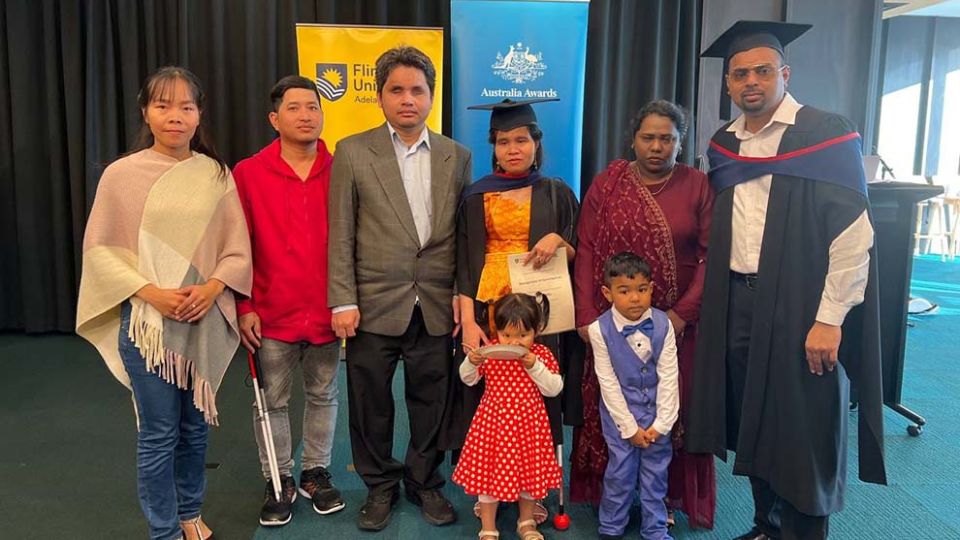PHNOM PENH (ANN/THE PHNOM PENH POST) – In a remarkable testament to perseverance and courage, a visually impaired mother from Cambodia has embarked on an extraordinary educational journey, accompanied by her young daughter.
Min Chenda, aged 34, recently celebrated the culmination of her efforts with the attainment of a Master’s Degree in Disability Policy and Practice from Flinders University in Adelaide, Australia.
Her achievement, supported by the prestigious Australia Awards Cambodia scholarship, represents a significant milestone in her ongoing battle against adversity and her steadfast advocacy for the rights of individuals with disabilities.
Chenda’s story not only highlights personal triumph but also sheds light on the resilience of Cambodian women facing compounded challenges such as visual impairment.
“When I return home, I will go to work in a government job, and I will share what I have learned from Australia as much as I can,” she told the Post.
Chinda initially relied on assistance to make the daily 2km journey from her home to the university. Now, she confidently makes the trip alone, on foot.
Even though the surfaces are uneven in some places and there are several stairways to be navigated, she notes that the trip is far easier than a comparable commute would be at home in the Kingdom.
Traffic facilities are designed with people with disabilities in mind, and she has no problems using pedestrian crossings as all vehicles are required to stop for her, and do so.
The infrastructure at her university has also been thoughtfully designed to support visually impaired students.
Buildings and walkways are marked with signs in braille, ensuring she can navigate independently. Chinda also appreciates the kindness of strangers.
“Whenever I stop in one place for very long, people always come over to ask if I need assistance getting anywhere,” she says.

Keeping the family together
Despite the triumph of her graduation, Chenda’s journey is far from over. She is currently applying for a visa extension to remain in Australia until her husband, who is also visually impaired, completes his studies next year.
Their stay will also allow their two-and-a-half-year-old daughter to continue her early education in an inclusive and supportive environment.
“I am applying for a visa to stay with my husband for another year. This will give our daughter more time to learn the basics of education. When she reaches three-and-a-half-years old, her knowledge will be strong enough to continue to study in Cambodia,” Chenda says.
The extra preparation is crucial, she explains, as their daughter speaks limited Khmer and will face a challenging transition upon their return to the Kingdom.
A history of overcoming the odds
Chenda, from Tbong Damrey village in Kandal province, began experiencing vision problems in grade 4 and was completely blind by grade 6. Her family sent her to learn braille.
Despite living with a disability, she excelled academically, ultimately earning the scholarship which allowed her to pursue her Master’s Degree.
Before embarking for Australia, she worked as a civil servant at the Ministry of Social Affairs, Veterans and Youth Rehabilitation.
Despite her educational achievements and professional experience, she anticipates difficulties finding employment upon her return, due to the pervasive stigma associated with her visual impairment.
“I’m not sure if I will be able to find a high-paying job,” she says.
Chenda’s concerns extend to her husband, highlighting the uncertain employment prospects for individuals with disabilities in Cambodia.
“We will wait to see the reality,” she adds.
Advocacy and awareness
Throughout her studies and personal experiences, Chenda has become acutely aware of the societal barriers faced by people with disabilities. She emphasises the need for greater awareness and inclusivity in the workplace.
“Due to the limited openness of the outside world and limited awareness of disabilities, most people do not understand what people with disabilities can bring to the workplace,” she says.
This lack of understanding often results in missed opportunities for both individuals and institutions.
Chenda urges employment agencies to focus on the abilities of people with disabilities rather than their limitations.
“Some institutions don’t think of what we can do to benefit them. At that time, our work was not recognised equally, more because of people’s mentality than our abilities,” she explains.
She advocates for a mindset shift towards recognising the contributions that people with disabilities can make to society.
Goals for the future
Despite the challenges she continues to face, Chenda remains optimistic and committed to making a difference. Her time in Australia has been transformative, providing her with accessible education, equal rights and a degree of independence she had never experienced before.
“My time in Australia has been completely life-changing because I enjoyed accessible education, equal rights, and considerable independence,” she explained, via a social media post by Australia Awards Cambodia.
“For the first time, I had more than enough food, enough money to cover my necessities and the freedom to express my concerns without fear of being ignored,” she added.
As she prepares to return to Cambodia, Chenda is determined to leverage her education and experiences to support community growth and inspire others.
“I want my story to show that dreams are possible if you work hard and have support,” she said.
Australian awards pave way for future leaders
The Australia Awards Scholarships (AAS) are prestigious international awards offered by the Australian government to the next generation of global leaders.
Each year, AAS provides education opportunities to talented Cambodians to study at Australian universities.
Over 1,000 Cambodians have benefited from these scholarships since the 1970s.
Return to the Kingdom
Despite her own struggles, Chenda, a former psychology student at the Royal University of Phnom Penh, previously volunteered to help others with disabilities.
Imagine a low-income, visually impaired mother living at a pagoda, but determined to further her education.
Now, she’s received her Master’s Degree from Australia. It was a dream come true for Chenda.
“I’ve completed my Australia Awards Scholarship and I’m preparing to return to Cambodia in just one year,” she says.
Chenda acknowledged that she had mixed feelings. She was delighted to have earned a higher degree, her proudest achievement, and was happy to return home.
However, she felt her time in Australia had gone by quickly and she wasn’t prepared to leave.
“I’ll dearly miss the inclusive environment where my impairment isn’t a barrier. Because of the accessible infrastructure, I felt comfortable disclosing my disability and could move around with my husband and child on my own,” she was quoted as telling the AAS.






